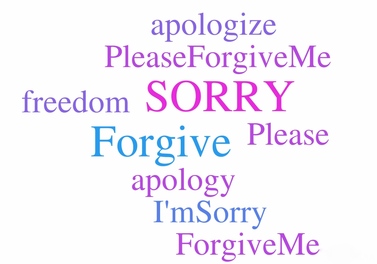His jaw dropped. He took the money and forgave me. Something that had been eating at me for decades was repaired. It was one of the hardest things I've ever done. It was also one of the most freeing.
We've got the easy "sorry," like when you bump into someone by accident, "Oh, excuse me, sorry."
But then there is the soul-searching-face-the-facts apology. Those kinds of "sorry" are harder to get to. What's the hardest part about saying you're sorry and asking for forgiveness?
There are two situations when asking for forgiveness is especially hard:
- You don't think you did anything wrong, or
- You did or said something you feel badly about
So let's start with the "why" ask forgiveness. This is big.
- It keeps the peace in relationships
- It clears your heart and soul; it repairs a damage done
- It can bring healing
It can be hard to approach someone to ask forgiveness because it's possible that you'll be rejected. That's disheartening and disappointing. Or, the person you're apologizing to will take this as an opening to attack you. Not good at all and then you have to set a boundary. It can be really hard if you did something you're truly ashamed of. Admitting that feels humiliating (like my story above).
How to ask:
The first thing before approaching someone to apologize is to set your intention:
- What do you want from the connection?
- Are you centered in your heart?
- Are you standing in the place of righting a wrong?
- Saying a prayer and asking for Divine assistance in healing the situation is very powerful.
Inside you there is regret somewhere. So use this as a springboard into the decision that you will do your best to do better next time. Feel free to share that.
If you don't think you did anything wrong, saying sorry is a way to keep peace. In a world where peace is sorely needed, you have a chance to let go of ego and go to another soul to bring healing. "I'm really sorry that I caused you pain." That is real. You are not opening up to get pushed or hurt in any way. If the reaction is not nice and you need to set a boundary, do it. We're not talking groveling, but we are also not talking about striking back if someone strikes out at you. You did your best and can let it go. It is swallowing pride and giving a gift. It's the high road and it's worth it.
If you've done something you know was wrong: said something biting and mean, stolen something, embarrassed someone, let someone down somehow, and so on it could be really hard to face that person.
A friend shared that at her high school reunion a woman came up to her with open arms to hug her. She stepped back and said, "How can you hug me? You were a bully and you were mean to me." The woman answered, "I know. When we were young I was being abused in my home and I didn't know how else to deal with it. I came to say I'm sorry." Can you imagine the courage it took for that woman? Can you imagine the healing that took place that day?
When not to apologize:
If bringing up something you want to apologize for will bring more hurt than keeping it to yourself. The idea is not to cause someone else pain to relieve your guilt.
Take account within yourself. Bring peace. Free yourself. Repair the world. Be strong and step into your courage. Let the healing begin.


 RSS Feed
RSS Feed
